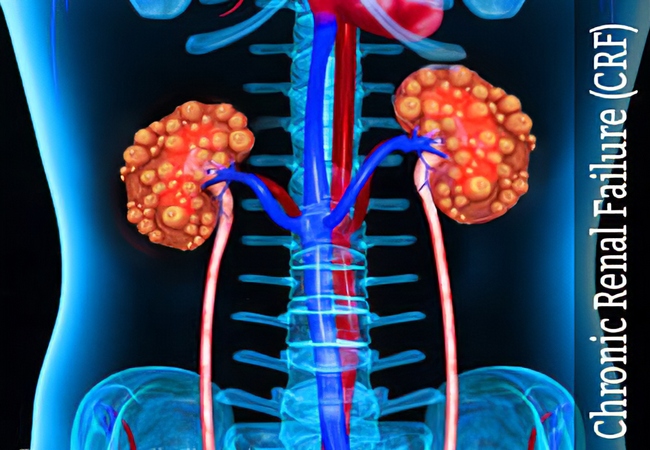Definitions of Chronic Renal Failure (CRF):
Chronic Renal Failure refers to an irreversible deterioration in renal function which classically develops over a period of years.

Common Causes of Chronic Renal Failure (CRF):
1. Congenital and inherited:
- Adult Polycystic kidney disease (APKD)
- Alport’s syndrome.
2. Vascular disease: Renal artery stenosis
3. HTN
4. Glomerular disease: IgA nephropathy-most common.
5. Interstitial disease:
- Chronic pyelonephritis
- Reflux nephropathy.
- Analgesic nephropathy.
6. Systemic inflammatory disease:
- SLE
- Vasculitis (PAN).
7. Diabetes mellitus.
8. Amyloidosis.
9. Obstructive uropathy.
10. Unknown.
Clinical Features of Chronic Renal Failures (CRF):
Patients may remain asymptomatic until the GFR is 15 ml/min or less (until 70% nephrons are dead).
1. Anaemia
2. Renal osteodystrophy:
- Osteomalacia
- Osteitis fibrosa
- Osteoporosis
- Osteosclerosis
3. Generalized myopathy:
- Muscle cramps
- Restless leg syndrome
4. Neuropathy:
- Paracsthesia
- Foot drop
5. Endocrine abnormalities:
- Hypertension
- Atherosclerosis
- Pericarditis
6. Acidosis:
- Breathlessness
- Deep respiration
7. Infection: Urinary tract infection is common
8. Bleeding: Cutaneous ecchymoses and mucosal bleeds (in advanced causes)
9. Gastrointestinal disorders: Anorexia followed by nausea and vomiting is commonly seen (especially in the morning).
Stages of Chronic Renal Failure (CRF):
Below shows the five stages of CKD and GFR for each stage:
- Stage 1 with normal or high GFR (GFR > 90 mL/min)
- Stage 2 Mild CKD (GFR= 60-89 mL/min)
- Stage 3A Moderate CKD (GFR 45-59 mL/min)
- Stage 3B Moderate CKD (GFR =30-44 mL/min)
- Stage 4 Severe CKD (GFR= 15-29 mL/min)
- Stage 5 End Stage CKD (GFR <15 mL/min)
Investigation of Chronic Renal Failure (CRF):
- Urine for RME, C/S: Volume increase, pH decrease.
- Blood for TC, DC, Hb%, ESR: anaemia
- Total platelet count: Low
- Blood urea creatinine: Raised
- Serum electrolytes: Hyperkalaemia
- X-ray chest and KUB region
- Ultrasonography of KUB region
- CT scan (DTPA/DMSA)
- Renal biopsy (confirmatory)
Management of Chronic Renal Failure (CRF):
1. Conservative (Symptomatic):
a) Diet: Restriction of dietary protein to about 40 g/day (0.58 g/kg/d in children) with adequate carbohydrate (250 g) and fat (60 g) to provide an adequate calorie (at least 1700 kcal)
b) Fluid: Fluid restriction if GFR is <5 ml/min or cardiac failure is present.
c) Electrolytes:
- No sodium restriction in absence of oedema, cardiac failure or hypertension.
- Restriction of potassium: Avoid high potassium foods (eg, banana, tomatoes, coffee chocolate)
d) Hypertension and cardiac failure:
- Hypertension: Antihypertensive drug (eg, ACE inhibitors, Ca-antagonists)
- Cardiac failure: Digoixn
e) Renal osteodystrophy:
Hypocalaemia: 1 a hydroxyl cholecalciferol 0.25-l ug/d
Hyper phosphataemia: Avoid high phosphate food (milk, cheese, eggs) and use of phosphate binding drug-
- Calcium carbonates 500 mg with each meal,
- Aluminum hydroxide capsules (Alucap) 300 -600 mg before cach meal.
- Parathyroidectomy may be needed.
- Correction of anaemia, infection if present.
f) Treatment of pruritus:
- Antihistamine
- UV rays
- Proper skin care + maintenance of hygiene
2. Replacement of renal function:
- Haemodialysis
- Continuous ambulatory peritoneal dialysis (CAPD)
- Renal transplantation (definitive treatment)
Complication of Chronic Renal Failures (CRF):
- Hypertension,
- Pericarditis,
- Cardiomyopathy,
- CCF,
- Severe anaemia,
- Bleeding, gastric ulcer,
- Hepatitis,
- Peripheral neuropathy.
Difference Between Acute Renal Failure (ARF) and Chronic Renal Failure (CRF):
Points of Difference | Acute Renal Failure (ARF) | Chronic Renal Failure (CRF):
|
Duration to develop | Within days to weeks | Over period of years |
Oliguria/anuria | Usually present | Usually not present |
BP | Hypotension | Hypertension |
Anemia | Usually present | Present |
Hyperkalaemia | Severe | Moderate |
Reversibility | Usually reversible | Irreversible |
Size of kidney | Normal | Small |
Renal | Absent | May be present |
Peripheral | Absent | May be present |
Myopathy | Absent | May be present |

Maria Khatun Mona is a Founder and Editor of Nursing Exercise Blog. She is a Nursing and Midwifery Expert. Currently she is working as a Registered Nurse at Evercare Hospital, Dhaka, Bangladesh. She has great passion in writing different articles on Nursing and Midwifery. Mail her at “maria.mona023@gmail.com”
